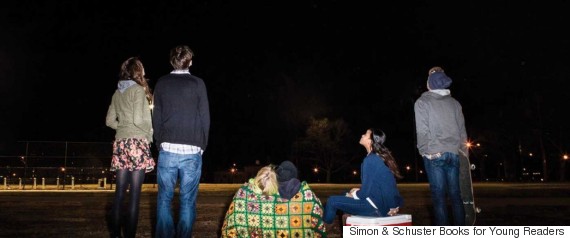
Next week, my debut YA novel, We All Looked Up, will be published by Simon & Schuster. It tells the story of four teenagers at the same Seattle high school. At the beginning of the book, an asteroid called Ardor is spotted in the sky, and it turns out it has a sixty-six percent chance of colliding with the Earth in about two months. The novel tracks these four teenagers as they try to make meaning out of what little time they have left. Think "Deep Impact" or "Armageddon," but without any Bruce Willis heroics or Aerosmith power ballads.
I don't have any pretensions that I've hit on some totally original idea. The aforementioned movies, to say nothing of Lars von Trier's brilliant "Melancholia" or the poignant romantic comedy "Seeking a Friend for the End of the World," all involve asteroids. Karen Thompson Walker's The Age of Miracles and Ben Winters's Last Policeman trilogy explore similar territory in the adult fiction space, and both Susan Beth Pfeffer's Life As We Knew It series and Alexandra Coutts's Tumble And Fall specifically address the asteroid trope for young adults. But the truth is, it doesn't matter how original the idea is. There's a reason that these types of stories continue to get told, and more importantly, continue to be read, watched, and listened to. Everybody loves a good apocalypse.
As long as we've been telling stories, we've been telling stories about the end of the world. The Epic of Gilgamesh, written around 2000 B.C., tells the original flood story, which then appears in modified forms in the Bible, the Quran, and even Buddhist and Jainist texts. The New Testament also gets in on the game, through the famously fiery Book of Revelation. The first modern novel considered a work of apocalyptic fiction is Mary Shelley's The Last Man published in 1826. (Shelley also penned what's considered the first modern monster novel -- that girl was on top of her stuff!) The Last Man tells the story of the few survivors of a worldwide plague--not so far removed from Cormac McCarthy's The Road or Margaret Atwood's MaddAddam trilogy.
Since then, the flood (pun intended) of apocalyptic fiction has never stopped. H.G. Wells' The Time Machine, Walter M. Miller's A Canticle for Leibowitz, Ray Bradbury's The Martian Chronicles, Stephen King's The Stand, Richard Matheson's I Am Legend -- the list goes on and on. But perhaps nowhere has the apocalypse story been more central than in present-day YA. Whether it's the totalitarian Panem of The Hunger Games, the mysteries of The Maze Runner, or the apocalypse-in-progress in Andrew Smith's madcap Grasshopper Jungle, it sometimes seems that every YA book on the shelf is some variation on the end-of-the-world theme.
At first glance, it might seem strange that teenagers would be so drawn to the apocalypse story. In most of these books, the apocalypse in question is a natural result of real problems we're dealing with today: climate change, antibiotic resistant superbugs, drought, or violence enacted by totalitarian governments. Don't kids find that sort of thing depressing? Wouldn't they rather read hopeful stories, about how we ended up solving society's problems?
Of course these questions are rhetorical. As Daria taught us so long ago, kids love being dark (and can we please get the Daria movie starring Aubrey Plaza now?). They don't want to read about a sugarcoated future; they want to hear the bad news first. The hopeless despair that characterizes the apocalypse story is precisely what young people--and ex-young people, for that matter--love about it.
The Greek root of the word "apocalypse" means "revelation"--or more specifically, "an unveiling or unfolding of things not previously known and which could not be known apart from the unveiling." I think this definition perfectly encapsulates why human beings are so hungry for these kinds of stories. There is a way in which end-of-the-world fiction allows us to look some scary things in the eye, things that more naturalistic fiction simply ignores.
This is why it's so important to remember that fantastical stories aren't inherently escapist (a lazy but sadly prevalent attack that's often lodged against science fiction and fantasy books). The best science fiction and fantasy novels, be they for teenagers or adults, remain our most socially and politically-engaged literary works. The fact that young people are so attracted to these stories is good news. It means that they're engaging with real issues: environmental, political, and even spiritual.
For this reason, I hope the apocalypse story stays with us forever -- or at least until the end of the world.
Tommy Wallach is the author of We All Looked Up.